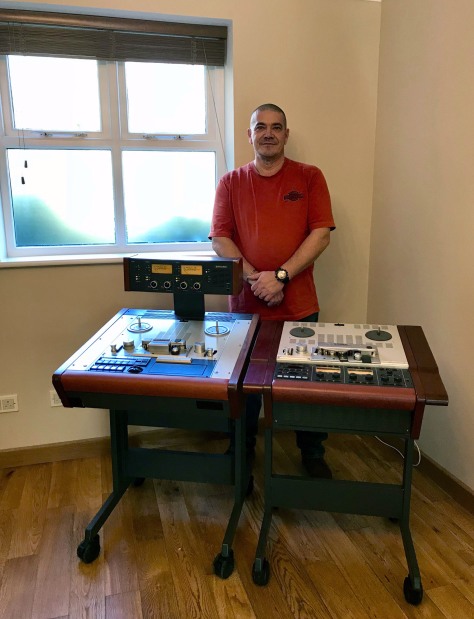Do you live, breathe, eat, sleep and dream music and sound? Then, dear reader, I’m delighted to report that I’ve discovered something that can help: The Audiophile’s Clinic. Don’t worry, this isn’t a rehab clinic. Nobody’s going to try to cure you of your addiction. On the contrary, the aim of The Audiophile’s Clinic is to help ensure that you can indulge freely in your obsession (sorry, hobby), delve yet further into your passion for music and feed your need for audio nirvana unimpeded. To put it another way, The Audiophile’s Clinic is here to ensure your musical wellbeing.
 The services offered by The Audiophile’s Clinic span most aspects of the audio journey: advice on equipment; custom installation; consultancy on system set-up, integration and in-room acoustics; mechanical and electrical equipment maintenance; vinyl restoration, and high quality audio transfer between formats. You can find out more at www.audiophilesclinic.co.uk but here I’m going to zero in on my own particular experience, which has focused on the servicing, repair and restoration of two vintage reel-to-reel tape machines.
The services offered by The Audiophile’s Clinic span most aspects of the audio journey: advice on equipment; custom installation; consultancy on system set-up, integration and in-room acoustics; mechanical and electrical equipment maintenance; vinyl restoration, and high quality audio transfer between formats. You can find out more at www.audiophilesclinic.co.uk but here I’m going to zero in on my own particular experience, which has focused on the servicing, repair and restoration of two vintage reel-to-reel tape machines.

The ‘doctor’ in question is Petronel Butuc, and his knowledge, experience and services make for impressive reading. This is a man with both a breadth and depth of expertise, which personally I’ve always found preferable when dealing with anything complex and multi-faceted, not just audio. I want somebody who’s peerless on detail and yet equally able to consider the big picture and apply joined-up thinking. I also like to work with somebody who really listens, fully understands what I need and takes a service-led approach – by which I mean that their guiding purpose is to help me achieve what I want to achieve, rather than to show me how clever they are or how big their ego is. If they’re also genuinely friendly, a fellow music lover and audiophile, fascinating to chat with and a pleasure to work alongside, then all the better. Having recently engaged the services of The Audiophile’s Clinic on two major projects, I can happily confirm that Petronel Butuc delivers all of the above – in spades. Otherwise I wouldn’t be writing this.
Tape: the support problem
The burgeoning revival of reel-to-reel tape – in which I’m an enthusiastic protagonist – comes with a bit of a conundrum. Since there are currently no new machines being manufactured or sold (yet, but watch this space…), there’s no established after-sales service network.
Up until the early 1980s the recording industry was all-analogue and so the world’s ample supply of active, in-service tape machines was kept in tip-top condition by a network of highly trained and skilled engineers. But inevitably, as analogue gave way to digital both in recording studios and at home, demand for tape engineers fell away and so most of them either retired or redirected their talents elsewhere. These days there’s a mere handful of accomplished tape engineers out there and many of them work only with specific professional studios. Of those who do serve the consumer market, most tend to be quite busy with long turnaround times and may have reservations about taking on complex jobs that could prove too time-consuming. Either way, given the nature of supply and demand, few come cheap. And you’d have to be very, very lucky to find one within a reasonable distance of where you live.
All of which is a bit of a concern if, like me, you have a love of all things reel-to-reel and are keen to invest in your collection of tapes and one or two high quality machines on which to play them. First off, the second-hand vintage market for machines is pretty hot right now, but how do you know what to buy? (Take my word for it, there are some real con merchants out there, so keep your wits about you and make some serious enquiries before committing to buy anything). Ebay and Gumtree have plenty of listings, many from bona fide sellers, but how can you tell whether something’s a good buy unless you have the technical expertise to assess (a) whether the machine has been properly restored, or has the potential to be, (b) whether there’s anyone available to repair and service it going forward, and (c) how much all that’s likely to cost into the medium to long-term?
A bit of a breakdown
As I pondered all of this, one of my two current machines, a Studer A807, developed a fault. Disaster! I was in the middle of writing several tape reviews for one or two small record labels, as well as doing some recording for my partner (who’s a poet, among other things) and the thought of weeks or even months of downtime followed by a hefty invoice was a real downer. So much so that I decided to have a go myself! Armed with some telephone advice, a few manuals and the internet, I hesitantly got to work. And to my great astonishment, I did actually manage to resolve the initial problem. Trouble was, that wasn’t the only problem and beyond the basics I was way out of my depth.

As luck would have it, this is when I first crossed paths with The Audiophile’s Clinic’s Petronel Butuc. Petronel also happens to be the European distributor of Metaxas & Sins, creators of stunningly sculptural high-performance audio equipment, and it was in that context that we met. (They also happen to be in the process of developing a brand new tape machine – see Metaxas & Sins announces the creation of new ‘GQT’ portable analogue tape recorder).
When my dilemma inevitably came out in conversation and Petronel immediately said “I can look at that for you,” I’ll admit that I initially had reservations. I mean, I wasn’t about to let my beloved Studer be messed around with by just anybody! This was a complex machine and a difficult job. It needed somebody with highly specialist skills who really knew what they were doing. Then Petronel told me a bit about his professional background and I had to concede that he certainly sounded like he knew what he was about. And so, tentatively, I agreed to let him take my prized possession away for a diagnosis. Then we’d have another chat and see where I wanted to take it from there. In the meantime, he very kindly offered to lend me his own (very gorgeous) B67 machine to keep the withdrawal symptoms at bay. Now that’s what I call service!
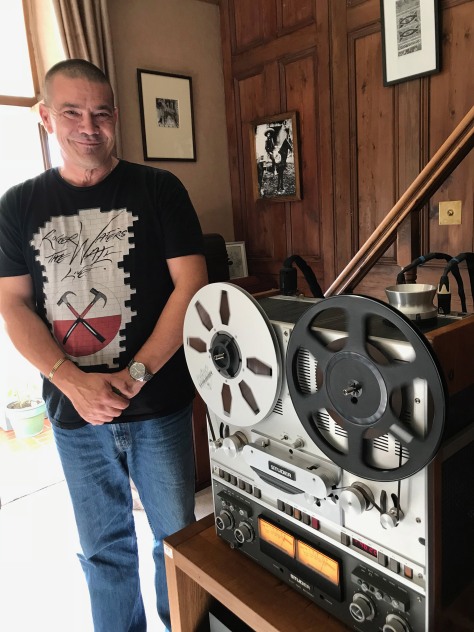
Talking tape: there’s more to it than just tech
The thing with a tape recorder, as Petronel explained to me, is that it has two very distinct elements: mechanical and electronic. So a tape engineer has to be skilled in two distinct areas of expertise. On top of that, the various vintage machines that are still around were all designed and manufactured in different time periods and in different countries, which adds a further set of complexities. Different countries and cultures around the world have varying ways of training their designers and engineers, which in turn leads to different ways of thinking about, and approaching, key aspects of mechanics and electronics. What’s more, these various modus operandi evolve over time, and so a Swiss machine conceived and built in the 1950s will be a very different beast to, say, a 1970s American machine – or indeed a German, British, Russian or Japanese one.
Having lived, studied and worked in a variety of countries for several decades, Petronel, who’s originally from Romania, has amassed considerable experience of each of these various approaches and so there’s a good chance that he can diagnose, repair, rebuild or restore pretty much any reel-to-reel machine from any manufacturer, period or geographic region. That said, he never takes anything for granted. “I like to stay curious,” he says. “If you begin every project with an open and curious mind, then you’re always learning, always discovering. That’s much more useful than assuming. If you assume, then your tendency is to look to prove yourself right, and so there’s a real possibility of overlooking something important. But when you stay curious, you work with what’s actually there rather than what you think is there. You notice everything, and then act accordingly.”
Can he fix it? Yes he can! The Studer thrives…
As it turns out, Petronel didn’t so much ‘fix’ my Studer as rebuild key sections of it, such that it is now in better shape than ever and performing at its peak.
When I first bought the machine a couple of years ago (its previous owner having been the radio station Classic FM), I took it to a specialist Studer engineer for an initial service and was told that it had a number of ‘gremlins’ that would no doubt begin to surface at some point. The engineer in question was very busy with studio work and didn’t have to time to do a full strip-down and rebuild, and besides, I couldn’t afford the many thousands of pounds it would have cost me. He did what he could in the time he had available, which took several months and still cost into four figures, and when I eventually collected my Studer it was working fine and sounding great, so I was happy. Skint, but happy!
But then, over time and as I’d been advised, the A807 began to develop problems as the gremlins found their way to the surface. So when Petronel took it away for a diagnosis, to say I was nervous would be an understatement. I needn’t have been, though. Following his initial diagnosis, and of course with my full agreement, Petronel undertook a complete rebuild in three distinct stages.
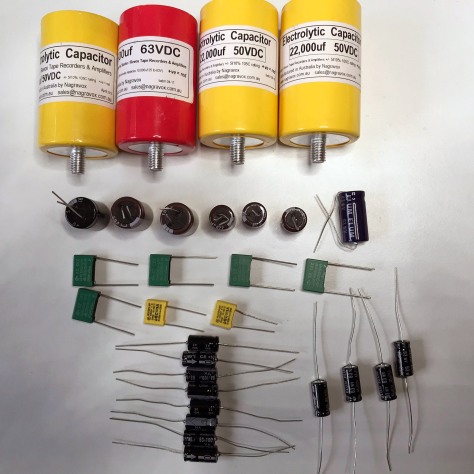
First, he completely rebuilt the power supply section and replaced every capacitor (capacitors are well known for ageing badly and these were 30 years old!). Second, he replaced and restored the tape transport sections. And third, he went right through the most minute software niggles with a fine-toothed comb (logic control circuits and the like) to bring the machine fully back to its ‘as new’ specification. The job took many dozens of hours and yet the bill came in at just shy of £2,000! This particular machine (the A807) was Studer’s ‘budget machine’ but still, it was a professional studio machine which, 30 years ago, cost upwards of £20k. Factor-in inflation and a similar machine manufactured today would cost more than double that. So that’s what I call value for money to restore my machine to ‘as new’ operating condition.

Raising the dead: or how we then brought a Studer A812 back from beyond
Having been suitably impressed by the depth, thoroughness and quality of Petronel’s work on my A807, I immediately booked him in for an even more ambitious project. A couple of months earlier I’d found another Studer, this time an A812, for sale at what seemed like an absolute steal of a price. The A812 is a very different beast to the ‘baby’ A807. It was just one step down from Studer’s top-of-range two-track machine and was created for the professional recording studio (mine had spent its working life at London Weekend Television). In fact many of the smaller studios wouldn’t even have been able to afford one, hence the subsequent introduction of the cheaper A807.
The A812 is a trolley-mounted model with VU bridge and a low-slung belly full of plug-in circuit boards. My model has ‘trafoless’ (transformerless) output boards which were more highly sought after since they produced an even higher quality of performance. But there was a reason I got it for a song: this was a ‘DOA’ (dead on arrival), a non-working machine. The big question was, was it resurrect-able?
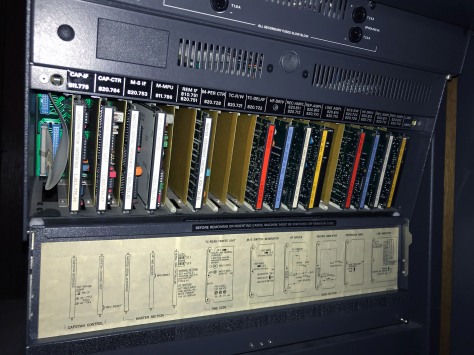
So, along came Petronel again to whisk the machine away to The Audiophile’s Clinic (by the way, did I mention that he will even come to you and collect the equipment, then return it to you on completion of the work – in this case travelling all the way from his home in Kent to mine in Somerset!). I watched the A812 disappear as his vehicle drove away and wondered whether I’d ever get to see and hear it in its full glory. As the weeks ticked by, my email inbox would occasionally ‘ping’ with an update and photos of work-in-progress as Petronel worked his way through the machine. Needless to say, this was a total rebuild and restoration job. As with the A807, he removed and replaced all of the capacitors, in both cases eschewing ‘like for like’ and instead using only the finest audiophile quality caps. Then he changed resistors, relays, the power filters, the switches, pretty much every bearing… the list goes on and on.

Being the geek that I am, I asked Petronel if he would save all of the old parts that he took out of the A812. Looking at them now, there must be around 200-300 components that were individually replaced! Peering at these ‘spilled guts’ it also becomes all too clear why, in their day, tape machines were such a major investment (often costing similar money to buying a house!) and why it took such highly trained engineers to service them. These are complex, multi-faceted machines. But, man, do they sound beautiful!
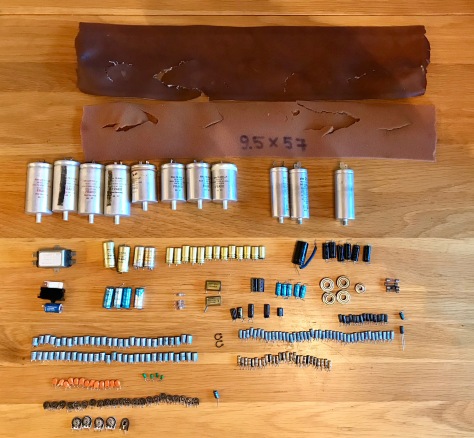
My A812 now sounds particularly beautiful. In fact, I’m pretty sure that it sounds even better than when brand new. And I feel just a little bit pleased with myself, knowing what a bargain I got. I took a risk and, this time, it paid off (of course they don’t always, that’s the nature of risks). The whole project, initial purchase included, cost me less than a used compact car. Which is lucky really since, as much as I love tape, there’s no way I’m ever going to sell my house to fund it!

Problem solved
If you’re in the market for a similar reel-to-reel adventure, or are considering your first tape purchase, then you can effectively remove the risk factor by drawing on Petronel’s expertise before committing to a purchase. He’s happy to advise on where to look for machines, on your choice of machine given your specific wants and tastes, and on whether any specific example seems like a good buy or not. If you’re a bit more experienced and want to have a stab at a refurb or some maintenance yourself, he’s equally happy to act as back-up and chat through any questions or problems.
He also has an enviable collection of tape machines himself – perhaps 30-40 or so. He doesn’t stock them specifically to sell, but every now and then he might be persuaded to let one of his precious machines go. Don’t expect to get one for a bargain basement price though, since he only collects the best machines from the likes of Ampex, Nagra, Stellavox or Studer and then restores them to within an inch of their lives! If you do manage to get your hands on one, then you’ll have invested in a very nice machine indeed. I’ve seen and heard examples of his work on Studers, Nagras and Stellavox and even on consumer machines such as Revox and Technics.
Suffice to say, Petronel Butuc’s The Audiophile’s Clinic is now my ‘go to’ resource for any and all things tape. Very highly recommended.
Find out more at www.audiophilesclinic.co.uk

